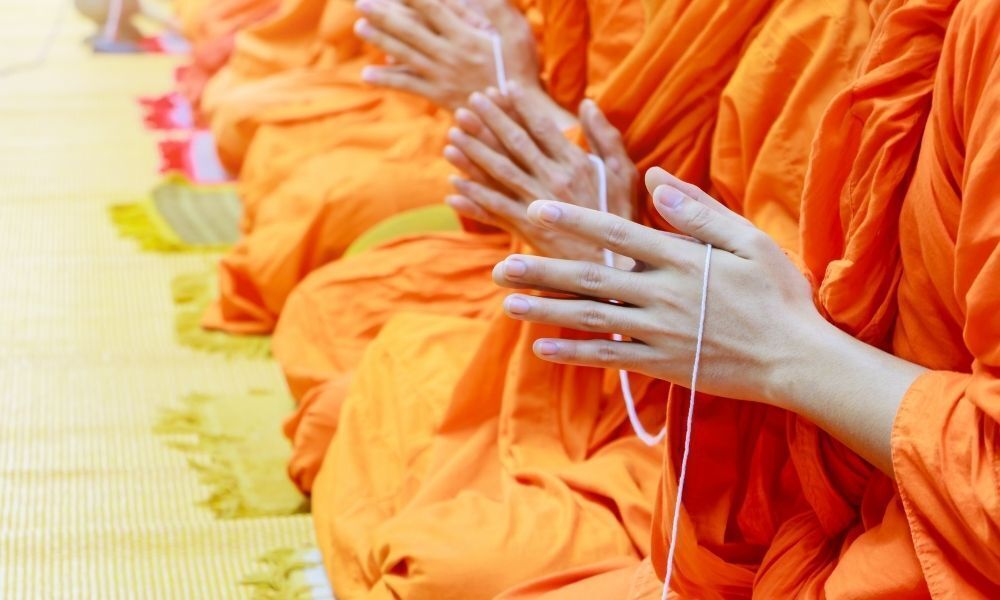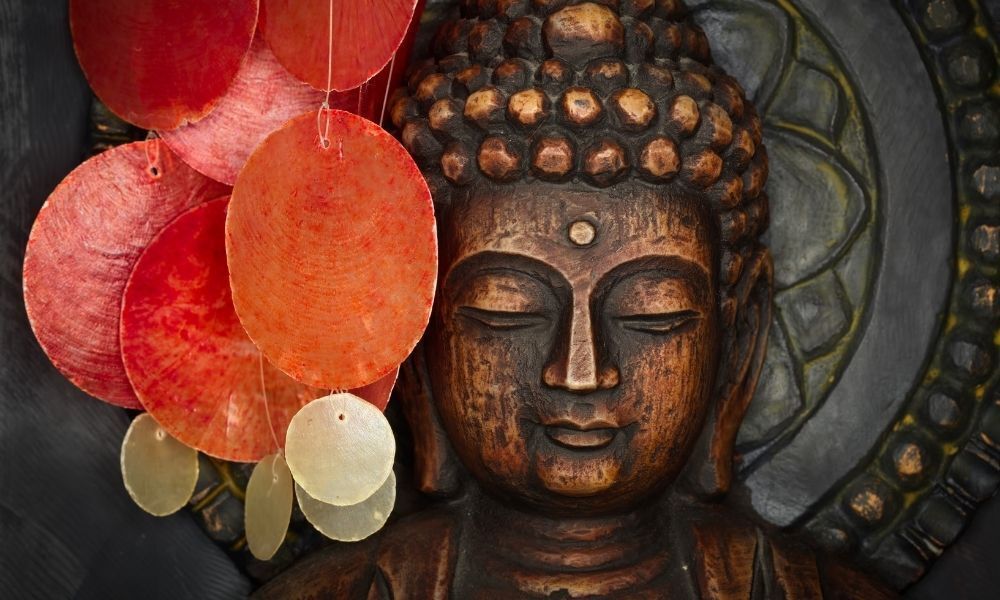Table of contents
What are the teachings of the Buddha

The teachings of Buddha are the basis of Buddhist philosophy and refer to self-knowledge and the perception of belonging to the whole. There are many strands of this religion, but the teachings are always based on Gautama Buddha, also known as Sakyamuni.
In an unequal society, Buddha was an Indian prince who abandoned a life of riches to understand the life of his long-suffering kingdom and help those in need. He felt the pain of his people in himself and realized that it was his own too, for together they formed the whole.
It was then that he abandoned the castle, shaved his hair (symbol of his high caste) and began to walk among his own, thus reaching enlightenment. Learn the teachings of this wise man who lived among us, such as the three truths and practices, the four noble truths, the five precepts and much more.
Buddha's teachings for a lighter life

To be able to have a lighter life and free from so many ties - both physical and emotional - Buddha teaches that forgiveness, patience and mental control are fundamental.
In addition, one should pay attention to the intention of the word, seek the end of hatred through love, joy for the victory of those around you, and the practice of good deeds. Understand better each one of these teachings.
Forgiveness: "To understand everything, it is necessary to forgive everything".
If you can forgive it is because you understand that the bad, the good, the pain and joy of the other person are also yours. Therefore, forgiveness is fundamental for growth, pain cession and enlightenment. After all, to reach this state you need to clearly understand the whole and for that, you need to forgive everything.
Understand that forgiveness does not mean allowing yourself to be hurt again, but understanding that the other person (or even you, when you are hurt) is still in the process of enlightenment - like everything else. In this way, if you cannot help without hurting yourself, just forgive and remove yourself from the situation, doing your best to generate greater balance in the Sangha, in the All.
Patience: "A pitcher fills drop by drop"
One of the Buddha's most important teachings is the need to foster patience. Just as a pitcher fills from drop to drop, all your needs (physical, mental and spiritual) will be met, at the right time and with the right effort.
In other words, you don't need to run, because everything has its time and it depends not only on you, but also on the whole that surrounds you. After all, you are part of the All and the growth of each one is your own growth. Just do the best with what you have and help those around you in your process.
Mental control: "Thoughts should not dominate us"
Letting the mind loose, free to any kind of thought or energy present is even irresponsible. You must be aware of what you are thinking, understand what the origin of that idea is and act wisely, always guided by the best choice for everyone.
Silencing the mind is almost impossible, but you can have control over which thoughts you will feed and which you will let go if you hold onto them. That way, they not only lose strength, but your thought control process becomes more intense.
Intention of the word: "Better than a thousand empty words is one that brings peace"
Many people are extremely verbose and expend a lot of energy on empty speech - of feeling, intention, or truth. According to the Buddha's teachings, better than a thousand empty words is one that brings peace. With the right intention, one word is enough to help those in need.
It is not that one should stop speaking carelessly, but rather pay attention to what one says, and especially how one says it, as this is essential for avoiding problems and thus maintaining peace. Choosing one's words wisely and trying to pay due attention to their meaning is part of the path toward enlightenment.
Hatred is not to be fought with hatred, it ceases through love
One of the Buddha's most important teachings has been summarily ignored these days. In a society increasingly polarized by larger forces, people must understand that hate is not fought with hate but with love.
The less you feed negative attitudes, whether of explicit hatred or passive-aggressive, the faster the Whole reaches enlightenment. It is not the case of blind acceptance, but of understanding the limitation and suffering of the other and with that, acting calmly and choosing words loaded with meaning and peace, through love.
Joy for other people's victory
One of the great joys in life is to see loved ones achieve their dreams or even live their small victories. Buddha already taught that rejoicing in the joy of those around you is noble, even more so when it comes to people who are not necessarily part of your cycle.
Likewise, envy, anger and other associated feelings, are extremely harmful - both for you and for the other - because they do not lead to the growth of the Whole. In addition, they also prevent you from enjoying one of the good things in life, the joy for the victory of others.
The Practice of Good Deeds
Practicing good deeds is the basis of any religion that seeks to truly "religare," and is therefore one of the Buddha's teachings for a lighter life. Helping others not only makes the other person feel better, but also those who practice good deeds.
And performing good deeds can happen in many ways, not only with donations, financial aid and the like, but mainly through words and gestures. Including, charity should start inside the home, respecting and helping your loved ones in their own development processes.
The three universal truths in Buddhism

There are three universal truths preached in Buddhism, arising from the teachings of Gautama Buddha: Karma - also known as the law of action and reaction; the Dharma - which are the teachings of Buddha; and Samsara - this continuous flow of growth and trials, which leads to enlightenment. Understand more deeply these three truths of Buddha.
Karma
The theory of causality in Buddhism is a little more complex than in other doctrines. At first, it deals with the consequences of one's actions, where what is done always returns, whether good or bad. However, since Buddha's teachings deal with the person as an interdependent member of the All, then Karma also follows this rule.
In other words, the evil and good done by humanity as a whole influence your personal karma, just as what you do influences collective karma. There is also a strong relationship with ancestral karma and the payment of debts inherited from previous generations.
Dharma
The Dharma is the set of ethical precepts of Buddhism. In the Buddha's teachings, you will learn a series of actions, thoughts and words - that is, ways of behaving in reality - that help in the process of seeking enlightenment.
Also known as one of the three jewels of Buddhism, the Dharma consists of the Sutras (teachings of the Buddha), Vinayas (codes of discipline for monks), and Abhi-dharmas (discussions of the Dharmas by sages who came after the Buddha).
Samsara
"Nothing is fixed and everything is in motion. "This is one of the truths preached by the Buddha's teachings.Just as suffering begins, it ends, when one is able to walk the middle path with greater control over the mind.
Samsara is this series of changes that we go through in life, like a wheel that never stops, except when we reach enlightenment, also called Nirvana.
The three Buddhist practices
There are also three Buddhist practices that lead to enlightenment. Through the Buddha's teachings, one finds Sila, also known as virtue; Samadhi, or mental development and concentration; as well as Prajna, understood as wisdom or enlightenment. Know below the ideal practices according to Buddhism.
Sila
One of the three practices of Buddhism is Sila, which corresponds to good conduct in relationships, thoughts, words and actions. This reaches the moral framework in force and acts in all layers of a person's life, being an important tool for learning and constant growth.
Sila's two most important principles are: equality, which treats all living creatures as equals - including that little cockroach or ant on the table; and reciprocity, which is in keeping with the Christian maxim of doing unto others as you would have them do unto you.
Samadhi
Samadhi practice is the focus on developing your mental capacity, either through study or meditation. Thus, it will be possible to have more concentration and find the path to reach wisdom and consequently, enlightenment.
With a strong mind, controlled and focused on the present, it is easier to maintain a proper conduct in life and achieve your goals. In this way, it also leads to greater freedom and development, creating a virtuous cycle of growth and good action.
Prajna
If you can maintain two of the three practices of Buddhism, automatically you will have the third. Prajna is to have more discernment when thinking, speaking or acting, always using wisdom and consciousness in the present moment.
In this way, one can affirm that Prajna is the result of the combination between Sila and Samadhi, uniting virtue and good action with mental development, thus generating wisdom. From this junction, one can achieve enlightenment, this being the axis of Buddhism.
The four noble truths

The belief system of Buddhism has four noble truths, which underpin the practices, these being Dukkha - the belief that suffering really exists; Samudaya - the understanding of the reason for suffering; Nirodha - the belief that there is an end to suffering; and Magga, translated as the path to that end.
See below the four noble truths in detail.
Dukkha - The Noble Truth of Suffering (Suffering exists)
Buddhism doesn't ignore suffering or see it as something good, which will atone for sins, but it considers that it is just a matter of action and reaction and yes, it exists. The teachings of Buddha are very clear about this, not least because the origin of the religion is related to Siddhartha Gautama's perception of suffering in his kingdom.
The Noble Truth of Suffering explains that it will inevitably happen, because the law of karma is certain, but one does not need to remain in atonement, but rather, to learn from pain and seek wisdom. For this, it is fundamental to understand its origin and how to act to avoid suffering in the future. Moreover, impermanence itself leads to suffering, since it is not possible to maintain the states ofhappiness for the desired time.
Samudaya - The Noble Truth of the Origin of Suffering (There is a reason)
Not only is suffering certain, according to the Buddha's teachings, but there is also a reason why it occurs. The Noble Truth of the Origin of Suffering deals with this non-permanence, both in the things one would like to keep, the things one has today and doesn't know if they will continue, and the things one would like to have.
Moreover, the cause of suffering may also be related to desire, greed and the like, and may also be related to more complex feelings, such as those of being something or existing in a certain way, as well as that of not being or existing.
Nirodha - The Noble Truth of the Cessation of Suffering (There is an End)
Just as suffering comes to an end, it also ends-this is the Noble Truth of the Cessation of Suffering, and it is one of the four Noble Truths of Buddhism. This truth shows that when suffering ends, there is no trace or trace of it, and only freedom and independence remain.
In other words, Nirodha ceases Dukka, after having gone through Samudaya, in order to reach Magga. They are in reality, truths related to the evolution of the soul as part of the All, because this freedom will only exist when all beings are free.
Magga - The Noble Truth of the Path that leads to the End of Suffering
Magga is the end of the cycle of suffering, according to the teachings of the Buddha. It is the Noble Truth of the path that leads to the end of sensations that disintegrate, deconstruct or destabilize. It is at this stage that the Buddhist begins to approach enlightenment.
What happens at this stage of the evolution process is that the mind begins to understand better what happens, more clearly and correctly. The language and action begin to echo this internal correction, reflecting in your effort, attention, concentration and life.
The Noble Eightfold Path

According to Buddhism, to attain enlightenment and cease suffering, it is important to follow the Noble Eightfold Path, which consists of a series of behaviors and ways of acting towards the world that lead to righteousness and greater understanding of one's oneness with All.
In this way, it becomes easier to put an end to suffering and live your life more fully and fulfilled. The Noble Eightfold Path shows the step-by-step process to reach enlightenment, even if it is not as easy as it seems in theory. Understand each of them better.
Samma Ditthi, the Right View
First of all, it is essential to know and understand the four noble truths, so as to be able to walk the Noble Eightfold Path, which leads to the end of greed, hatred and delusion, thus walking the so famous middle path, always in balance.
In the meantime, the Right View is about recognizing reality as it really is, without illusions, false expectations or personal perception filters. Just seeing what is the way it really is, without so much interference from your fears, desires, beliefs and the whole framework that changes the meaning of existence.
Samma Sankappo, Right Thinking
To be able to walk on the middle path, one's thinking must also be aligned with the precepts of Buddhism. In this way, it is essential to have greater control of the mind and work on being present in the moment, in addition to conscious breathing.
In this way, it is easier to keep the flow of thoughts under control, thus avoiding all kinds of slander or even ill will towards the other. It also helps not to want to do evil, because it originates in thinking, and then goes on to speak and act.
Samma Vaca, The Correct Speech
Maintaining correct speech is also important in order to keep on the middle path and achieve Magga, that is, the end of suffering. Correct speech consists of thinking before expressing oneself, trying to avoid harsh or slanderous words.
Besides, it is fundamental to try to avoid lying and to have a more constructive, positive and conciliatory speech. Many people like to argue, even if it is only about politics or the soccer team. This only feeds the body of pain and moves them further and further away from the middle path.
Samma Kammanta, The right action
Right action goes beyond acting in accordance with your values, including acts such as not destroying your life through drinking and eating too much, sleeping too little, or stressing yourself over things you shouldn't. Anything that threatens your quality of life and happiness is not considered right action according to Buddhism.
Furthermore, one should not take for oneself what has not been previously offered, avoiding covetousness and envy. One should also maintain a healthy and proper sexual conduct for those involved, resulting only in positive effects and always under control.
Samma Ajuva, The Right Livelihood
Everyone needs a livelihood, and according to Buddhism, this cannot be a reason for suffering and pain for other people. Therefore the Buddha's teachings show that it is fundamental to have a correct livelihood in order to maintain balance in the All.
In this way, maintaining moderation in your way of life is fundamental, without spending too much or being stingy, helping those in need whenever possible, but without harming yourself. It is also important to maintain a profession that is in accordance with your values, that is, that does not harm anyone.
Samma Vayama, the Right Effort
The idea of the correct effort is related to the adjustment of action, but with the appropriate intensity of execution. In other words, to make the correct effort is to direct your energy to things that will add to your life, focusing on what can help you grow.
To do this, you should let go of things that are harming you at this time or that could harm you in the future. Likewise, you need to invest more effort in activities that will bring benefits to you and those around you, leading to future beneficial states.
Samma Sati, Right Full Attention
With so much information, colors and movements available to catch your attention in specific points, such as a video or a forwarded message, it becomes more difficult to have the much needed full attention on everyday things, because the mind gets used to this intense pace.
However, to be able to find the middle path, being present in the moment is key, even if you are busy with work or leisure. Keeping your mind alert and aware of what is happening is key, leaving body, mind and speech according to what you really need.
Samma Samadhi, Right Concentration
Right concentration is also called the fourth Jhana and needs much work to attain, for it requires mastery of body, mind, speech and action. The Buddha's teachings show this Jhana as the state of no bliss or happiness, of fullness and equity.
By achieving the right concentration, you can complete the Noble Eightfold Path, passing through the four Noble Truths and arriving at Magga. In this way, you can be closer to the state of enlightenment, further helping humanity's karma.
The Five Precepts in the Buddha's teachings

Like any religion, Buddhism has some basic precepts that must be followed uprightly. There are only five in all, but they cover important areas of life. The Buddha's precepts are "Do Not Kill," "Do Not Steal," "Do Not Misuse Sex," and "Do Not Use Drugs or Alcohol. Understand why each one is important.
No Mate
It is possible that every religion, philosophy or doctrine takes this law into consideration. Buddha's teachings go a little further than other traditions, for when he says do not kill - for you are part of the whole and by committing such an act you are harming yourself - he is also talking about animals, such as the chicken, the ox or even the ant.
Don't Steal
If you don't desire what belongs to someone else and are content with your achievements, you're already on a good path. But still, Buddhism emphasizes the idea that you shouldn't steal, even if it's someone's place in line, the fruit of someone's intellectual or physical effort, or even objects.
Don't Misuse Sex
Sex is absolutely natural and very well regarded in Buddhism, however it is still an energetic exchange and all excess is looked at closely by the Buddha's teachings. Therefore, it is important to keep the sexual act healthy and as a complement to your life, not as the focus of relationships.
Do Not Use Drugs or Alcohol
Keeping the mind active and always in plenitude, observing the present moment, is fundamental to reach Magga, that is, the end of suffering. On the other hand, the use of narcotics - legalized or not - alter the functioning of the brain and for this reason their use is not recommended in Buddhism.
How can Buddha's teachings direct our mind towards goodness?

Every person is formed by a series of interdependent factors, such as upbringing, prevailing morals, genetics and much more. However, it is within the mind of each one that the small and big changes happen, because we are shaped by our thoughts, fruits of this mixture. As a result, it is in the mind that are born, develop and manifest the achievements.
If you learn to direct your mind toward something good, making your thoughts, words, and actions take the form of the expected change, then you will be able to achieve your dreams or even enlightenment more easily. For this, the teachings of the Buddha can be very helpful, as they show you the way to control your thinking and shape your life along the middle path.

